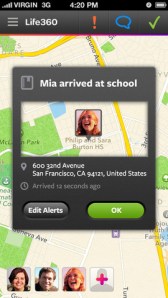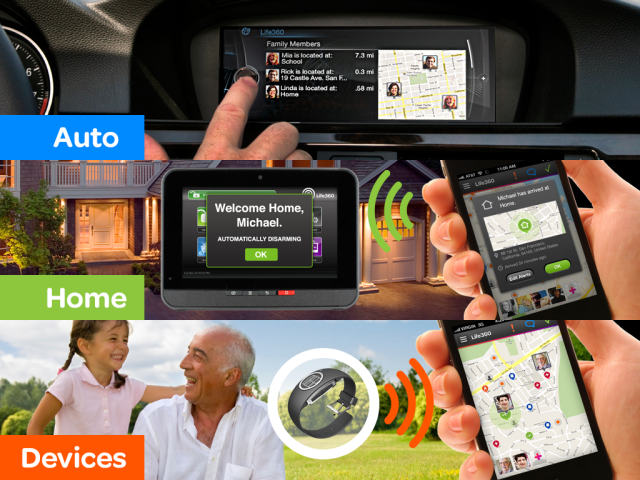Foursquare recently announced it has grown to 33 million users, but another, albeit older, location-based app called Life360 just crossed a milestone of its own: 34 million users. Yes, this family locator utility is now bigger than Foursquare – at least in terms of registered users. To be fair, the companies don’t disclose their actives.
Life360 is not what you would call an overnight success story. It was launched all the way back in 2008, Android first, before people were perhaps as comfortable with sharing their location as they are today. Its core use case involving family location tracking has slowly grown more relevant over the years, especially as more children and teens adopt smartphones. In fact, according to a recent report from Pew Internet, 37 percent of U.S. teens now own smartphones.
There are a number of applications busying themselves in the family locator or check-in space outside of Foursquare, of course. Both Apple and Google offer half-hearted efforts with apps like Find My Friends and Latitude, specifically. Others focus primarily on one aspect of family messaging – like the “panic button” apps that alert a network when a family member is in trouble. And more recent entrants like Hubble believe there’s room for apps focused mainly on private family networking.
 But Life360 CEO Chris Hulls thinks that the real potential for family connectivity outside of Facebook lies not in building smaller, more private, social networks, but rather with utility.
But Life360 CEO Chris Hulls thinks that the real potential for family connectivity outside of Facebook lies not in building smaller, more private, social networks, but rather with utility.
“There’s there’s interesting bias that whoever’s going to win family is going to look like Facebook but with a smaller group,” he says. “But maybe whoever wins family is just going to be doing things that’s so different from what’s out there today, that’s what’s going to make them take off.”
For Life360, its smartphone applications for iOS, Android and BlackBerry, offer a suite of services that have set the standard for what family locator utilities should provide: location-tracking, check-in (e.g. the “mom, I’m okay” button), geo-fenced alerts, messaging (both one-to-one and group chat), and the emergency/panic button alerting functionality.
But the plan now is to extend Life360 beyond being just an app. “A lot of times, when people think family location, they immediately think tracking, and we’re trying very hard to shake those connotations,” says Hulls. “When users use us, it’s much more like a family network users use to coordinate their daily lives.”
On that front, the company has raised a $3 million strategic round from BMW, closed in December, which will allow its service to be integrated into vehicles from the automaker. When complete, drivers won’t have to punch in an address to their navigation system, but can instead navigate to a person – the family member they’re heading out to pick up.
In addition, the company is also working on a deal that will allow the service to control home security systems, by automatically arming the alarm when it detects that no family members are in the house. This will include controls for thermostat and heating, too. “We want to be a platform for family data in a much bigger way,” Hulls explains Life360 has a few alarm system partners on this, he adds, but he can’t yet disclose names.
To move from app to platform, Life360 has also hired Steve Corona, former CTO of Twitpic, who is now helping the company build out the infrastructure and APIs. Hulls says this is a key hire because Life360’s infrastructure is massive – it’s the third biggest user of PHP in the world because users’ phones are connected all the time. He even notes that they get more request volume than WordPress and Wikipedia.
And though it may have taken some time to get there, just two months ago, Life360 began to monetize. Though it had experimented in the past with revenue generation, the company was primarily focused on growing its footprint. Now the company offers a premium suite of services for $5 per month (intro pricing – will be $7/month later on). This package includes an OnStar-like functionality which connects users to a live operator to get help, like roadside assistance or a locksmith, as well as stolen phone insurance ($100 towards replacement costs), the ability to add more geofences, and the ability to view a family member’s location history.
Though Life360 hasn’t yet marketed the service beyond making it available in app, the company has seen thousands of free-to-paid conversions so far. In the future, the company plans to add more features, including a “Circles” function to loop in caregivers or babysitters when need be, messaging improvements, and a (premium) concierge service.
Life360 is backed by $10 million in outside funding, including the recent $3 million strategic round from BMW. The company is planning to raise a B round in the near future.

